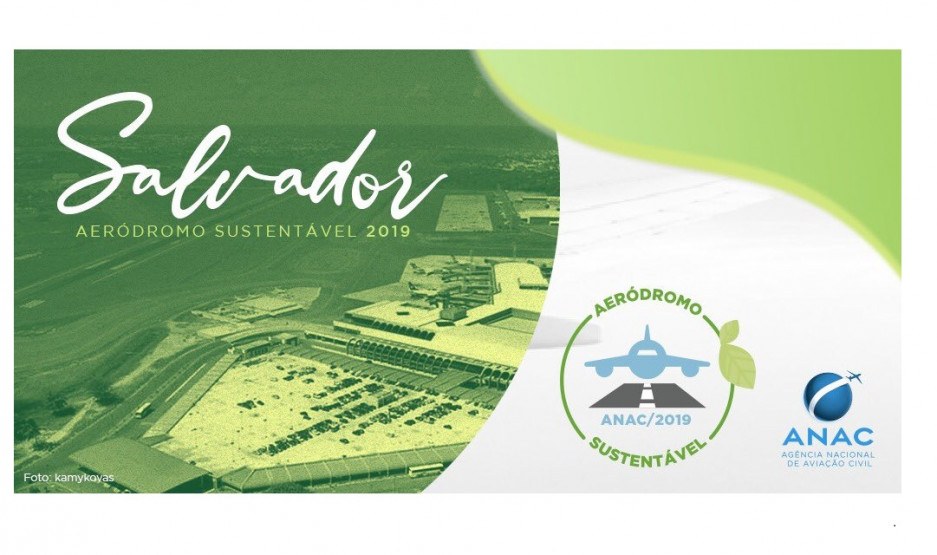
Salvador airport named Brazil's most sustainable airport

Salvador Bahia airport, a member of the VINCI Airports’ network, has just been acknowledged as the “Most Sustainable Aerodrome in Brazil in 2019”, in an unprecedented assessment by the country’s National Civil Aviation Agency (ANAC). The “Sustainable Aerodromes” survey has mapped environmental management practices at the country’s airports and relied on voluntary participation by the institutions.
In this mapping, 36 indicators were taken into account, including water, power and waste management, climate change, atmospheric emissions, noise, soil, fauna, and flora as well as environmental awareness-raising and organizational management. The capital of Bahia’s airport has met 33 out of the 36 criteria assessed, registered a score of 88.85% and was considered to have sustainable actions at an advanced level.
Such achievement is the result of Salvador Bahia airport joining VINCI Airports’ environmental program, called AirPact. Since integrating VINCI Airports’ network in 2018 Salvador airport became:
- Brazil’s first airport with zero waste to landfill
- Brazil’s first airport with zero liquid discharge : 100% of treated wastewater is recycled in toilets and air-cooling towers.
- A 100 % LED- lighting airport
- Salvador airport also obtained ACI’s Airport Carbon Accreditation level 2.

All these actions, by putting sustainability at the heart of the airport’s model, anticipate the mobility of the future, which will be more sustainable and technological.Salvador airport will keep moving forward with other great sustainable projects such as as 4.2 MW peak self-consumption PV park which should be inaugurated in the near future.
“We are aligned with VINCI Airports’ global environmental policy. Betting on the use of new technologies, improving processes and engaging employees in favor of sustainability are pillars that have been part of our commitment since we took over the concession of the Terminal”, said Salvador Bahia Airport’s CEO, Julio Ribas.
The acknowledgement by the “Sustainable Aerodromes” project adds to the Terminal’s other achievements in this area. The Airport is recognized as a “green airport” by the Airports Council International – Latin America and the Caribbean (ACI – LAC) and has achieved Carbon Accreditation Certifications (ACA) at both first and second levels.
“We are very happy with this new achievement. All the recognitions that we have achieved in sustainability are the result of unremitting, collective work carried out daily, in a planned, careful and strategic way”, highlighted Salvador Bahia Airport’s Environmental Manager, Rodrigo Tavares.
Learn about some of the Airport’s sustainable initiatives in different areas.
Water management – Thanks to the implementation of an Effluent Treatment Station (ETE) with 99.5% efficiency, Salvador Bahia Airport has adopted a system for reusing water in toilets, cooling towers, and other non-noble purposes. As a result, there has been a 37% reduction in the consumption of drinking water. Moreover, the faucets in the Terminal have aeration nozzles, which reduces water flow without affecting the user’s perception.
Energy Efficiency and Reduction in Carbon Emission – Having achieved level 2 of the ACA (Airport Carbon Accreditation) certification, the Airport acts on this front with improvements to the air conditioning system, the installation of intelligent devices such as presence sensors on the stairs, elevators and toilets and the replacement of conventional lamps by LED. In addition to that, it is the first in the country to have a solar plant supplying the Terminal. The equipment has 4,215kWp of power and aims at reducing the Airport’s carbon footprint by 30%, which is equivalent to 690 tons per year.
Solid Waste Management – Salvador Bahia Airport is the first “Zero Waste to Landfill” airport in Brazil. The totality of the waste generated at the Terminal is collected, classified in its Solid Waste Centerand allocated properly, being used as raw material for recycling or for the generation of energy and cement. Annually, more than 1,300 tons of solid waste are processed and reintroduced into production processes, thus adopting the concept of circular economy.
Valorization and preservation of Biodiversity – Salvador Bahia Airport has over 200 cataloged bird species and develops fauna risk management. Through the fauna management license, it monitors, captures with techniques that do not cause damage to animals, deliver veterinary treatment, species identification and subsequent release to nature in licensed places. Thus, it preserves local biodiversity and reduces collisions with damage to aircrafts by 80%.


